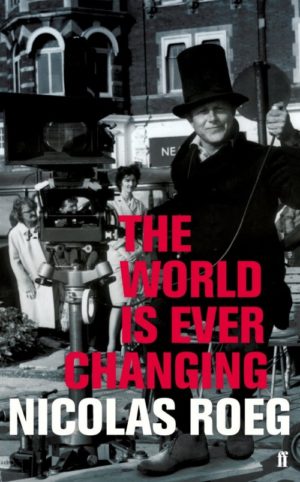 By NICOLAS ROEG (Faber and Faber; 2013)
By NICOLAS ROEG (Faber and Faber; 2013)
There’s simply no way to sugar-coat the fact that this book is a huge disappointment. It was the long-in-coming memoir by England’s late Nicolas Roeg (1928-2018), the director of classic films like DON’T LOOK NOW, THE MAN WHO FELL TO EARTH and THE WITCHES. A brilliant filmmaker Roeg undoubtedly was, but his shortcomings as a writer are painfully obvious throughout THE WORLD IS EVER CHANGING, which functions as an autobiography, instruction manual and philosophical treatise, yet ultimately satisfies as none of those things.
It begins in more-or-less standard biographical fashion, with a brief recounting of Roeg’s war-torn childhood, his military service and his early years as an assistant cameraman at MGM’s London branch. From there Roeg launches into a kaleidoscopic swirl of memory and speculation that follows no chronological rules of any sort. The idea, as Roeg makes clear in his prologue, was to render the fractured chronology that characterized his filmmaking in textual form, but alas, what results is an unsatisfying jumble of incomplete thoughts.
Several of Roeg’s films are discussed, but never in any great depth. He can never seem to focus on any one topic for very long, constantly bringing things up and then abandoning them before the point is made. Further annoyance is provided by the frequent quotations and real-life anecdotes Roeg is always bringing up to flesh out his theories, anecdotes that more often than not fail in that endeavor, and aren’t always coherent (such as a rambling account of being fired as director of photography of DR. ZHIVAGO, which only serves to confuse rather than clarify).
Roeg’s overall attitude, at least, is interesting. As is fitting for such a fearless experimenter, he, in contrast to most 85 year olds (the age he was when this book was published), is optimistic about the future and excited about the technological innovations of the modern age. Roeg also writes a great deal about reincarnation and the supernatural (“Reason sets the boundaries far too narrowly for us and would have us accept only the known. The more “critical reason” dominates, the more impoverished life becomes”), the one portion of the book in which he actually allows his thoughts to stay focused and reach their natural conclusions.
For those wanting true insight into Nicolas Roeg’s oeuvre I’d recommend tracking down Joseph Lanza’s excellent critical study FRACTURED GEOMETRY, or better yet viewing one or more of Roeg’s films. As for this book, it can be skipped.
